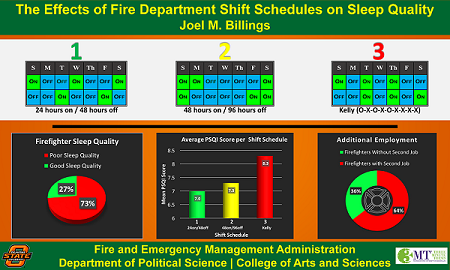Current Projects
1) Experimental design measuring the before-and-after effects of changing shift schedules (24/48 to 48/96) on firefighter sleeping habits and sleep quality. This study has three data collection rounds: pre, post1 (3-month), and post2 (6-month).
Update: View Results
Update: View Results
2) Fire Department Program Elevation - Experimental design with pre and post measurements of sleeping habits, sleep quality, performance, and health variables during a shift schedule change. The results will provide evidence for decision making after the department's trial period.
Update: Analyzing Data
Update: Analyzing Data
Past Projects
NationalUnited States Fire Administration - Practitioner Summary
Joel M. Billings and Will Focht
Background: Previous medical research has found that acute
and chronic adverse health effects are associated with poor sleep quality and
sleep deprivation. Acute effects include poor performance, low levels of
alertness, slowed reaction speed, inhibited memory recall, and decreased
cognitive functioning. Chronic health effects such as increased risk of impaired
cardiovascular function, obesity, diabetes, gastrointestinal problems, and
depressed immune system can develop if poor sleep persists over long periods. Five
previous studies conducted in four nations including the US have confirmed an
elevated occurrence of poor sleep quality among fire and emergency service
personnel, which can threaten the health and safety of both firefighters and
the public.
This study investigated the relationship between sleep
quality and three popular shift schedules [24on/48off, 48on/96off, and Kelly
(on/off/on/off/on/off/off/off/off)] at six fire departments in three
southwestern US states. Shift schedules that disrupt circadian rhythms contribute
to poor sleep quality; the greater the disruption, the poorer the sleep quality.
Practitioner Takeaways from This Study
- Seventy-three percent of firefighters report poor sleep quality.
- The 24on/48off shift schedule is associated with the best sleep quality and the Kelly shift schedule is associated with the poorest sleep quality.
- Working second jobs during time off can contribute to poor sleep quality.
- Further studies are required to investigate the influence of factors other than shift schedule on sleep quality.
Billings, Joel and Will Focht. 2016. "Firefighter Shift Schedules Affect Sleep Quality," Journal of Occupational and Environmental Medicine 58(3):294-298. DOI: 10.1097/JOM.0000000000000624
- Abstract: The aim of this study was to investigate the prevalence and severity of firefighter sleep quality across department shift schedules. Methods: Sleep quality was assessed using a Pittsburgh Sleep Quality Index in a sample of 109 male career firefighters from six fire departments in three Southwestern US states. The three shift schedules studied were 24on/48off, 48on/96off, and Kelly. Results: Seventy-three percent of firefighters report poor sleep quality. The 24on/48off shift schedule is associated with the best sleep quality and Kelly is associated with the worst sleep quality. Firefighters working second jobs report significantly poorer sleep quality than those who do not. Conclusions: Shift schedules that disrupt normal circadian rhythms more result in poorer sleep quality, which can lead to less effective emergency response and increased risk to firefighter health and safety.
Presentation Poster/Supplement
Contact us for high quality version
Contact us for high quality version

